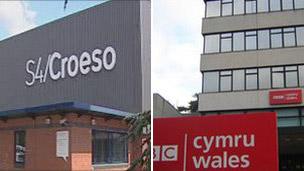BBC and S4C agreement public consultation launched
- Published

The UK government is making the BBC mainly responsible for funding S4C
An agreement setting out the future relationship between the BBC and Welsh language broadcaster S4C is being opened up to public consultation.
From April 2013, the majority of S4C's funding will be from the licence fee.
The BBC Trust and S4C Authority have drawn up a plan to ensure the editorial and managerial independence of S4C.
But the body representing Welsh independent TV producers is concerned at the BBC Trust's role in assessing S4C's performance and value for money.
The draft operating agreement, external states: "As well as governing the funding and accountability arrangements between the BBC Trust and the S4C Authority, the agreement will ensure the editorial and managerial independence of the S4C service."
It also sets out that the largest part of the licence fee contribution to S4C would be on programmes primarily in the Welsh language.
UK Culture Secretary Jeremy Hunt announced the new funding arrangements in 2010.
A year later, the BBC Trust and S4C Authority reached an agreement over the future and funding of S4C until 2017.
A statement at the time said the deal, agreed with the Department for Culture, Media and Sport (DCMS), "will protect the editorial and managerial independence of S4C, whilst safeguarding appropriate accountability to the BBC Trust for licence fee funding spent by the service".
The consultation, which will close on 23 October, wants individuals and groups to give their views on whether a draft Operating Agreement reflects the agreement made in 2011.
The agreement states that "S4C shall retain its editorial and managerial independence from the BBC at all times".
The document also includes the following points:
The S4C Authority will be primarily responsible for monitoring the channel's performance
The BBC Trust will carry out an annual assessment of S4C's quality, reach, impact and value for money
There will be joint quarterly meetings of BBC Wales and S4C management boards
S4C to make 10% efficiency savings in non-content costs between 2013/14 and 2014/15
S4C will receive £76.3m of licence fee funding in 2013/14, falling to £74.5m by 2016/17
The DCMS will contribute an additional £7m per year at least until 2015
S4C will continue to generate its own commercial income
In extreme circumstances, the BBC Trust can reduce or withdraw funding from S4C if the terms of the agreement are not being met
The BBC National Trustee for Wales, Prof Elan Closs Stephens, said the agreement would build on a successful 30 year partnership between the two broadcasters, balancing S4C's independence with accountability for its use of licence fee funding.
"It's a tricky balance but I hope we've got it right," she told BBC Radio Wales.
"I think the BBC will be a funder and a firm friend but not someone who is determining hour by hour what is going on screen.
"The biggest success story will be that S4C continues as it is and flourishes and the BBC is an active collaborator."
Huw Jones, chair of the S4C Authority, added: "There are two public service broadcasters who are deeply concerned about the Welsh language.
"These shared objectives and the agreement will drive us forward to make the best possible use of resources."
The 10-week consultation period will be launched at the National Eisteddfod at Llandow in the Vale of Glamorgan, with variety of options open to those wishing to share their views, external.
Iestyn Garlick, chairman of the Welsh independent producers organisation TAC, said they welcomed assurances about S4C's editorial and managerial independence.
But he told BBC Radio Cymru there were concerns about the extent of the BBC Trust's power to determine the nature of the service.
"They talk about value for money," he said.
"As soon as you get into assessing what S4C is worth by counting the number of people who watch it you get into the dangerous territory of comparing S4C with BBC Alba etc.
"The language is worth more than money."
Mr Garlick said he was also concerned about the prospect of the BBC Trust withholding funds from S4C.
"It is not the trust's place to do this. If that decision has to be taken it should be done by the DCMS or the relevant secretary."
- Published25 October 2011
- Published18 July 2012
- Published16 July 2012
- Published16 July 2012
- Published16 July 2012
- Published12 July 2011
- Published11 July 2012
- Published22 March 2012
- Published2 February 2012